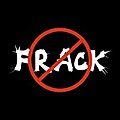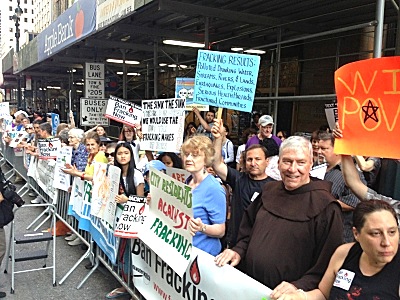- By -Staff
- News
 Print
Print  The New York Court of Appeals ruled 5-2 Monday that New York municipalities can ban hydraulic fracturing within their borders. In a historic win for Dryden and Middlefield the Court of Appeals upheld the rights of local towns over big oil and gas companies with its decision in Matter of Wallach, Trustee for Norse Energy v. Town of Dryden. Because the Court of Appeals is the highest court with jurisdiction over the case, the way is now clear for any New York Municipality to ban fracking. Lansing Town Supervisor Kathy Miller says she would like to enact a ban now that the court has ruled.
The New York Court of Appeals ruled 5-2 Monday that New York municipalities can ban hydraulic fracturing within their borders. In a historic win for Dryden and Middlefield the Court of Appeals upheld the rights of local towns over big oil and gas companies with its decision in Matter of Wallach, Trustee for Norse Energy v. Town of Dryden. Because the Court of Appeals is the highest court with jurisdiction over the case, the way is now clear for any New York Municipality to ban fracking. Lansing Town Supervisor Kathy Miller says she would like to enact a ban now that the court has ruled."I am thrilled with it," she says. "It's a risk we shouldn't take. And then find out ten or fifteen years down the road that we took this risk and this is what we have... another Love Canal. I feel concern about the communities where they have fracking. What's going to happen to them five, ten years down the road?"
Six weeks after the Dryden Town Board unanimously passed a ban, Anschutz Exploration Corporation sued. Dryden argued that their right to make local land use decisions, enshrined in the home rule provision of the New York State Constitution, applies to oil and gas development. In February 2012, a state trial court judge agreed. In May 2013, a panel of judges in a mid-level appeals court unanimously sided with the town. Monday’s decision by New York’s highest court is the final ruling in the matter. The decision gives legal backing to the more than 170 New York municipalities that have already passed similar measures.
“This decision is an important step to help keep gas drilling as far from my vineyard as possible," says King Ferry Winery owner Pete Saltonstall. "All we have worked for is threatened by the possibility of hydro fracturing being allowed in our part of New York State. Thanks to Dryden for taking this stand from which we will all benefit.”
A moratorium on hydro-fracking in the Town of Lansing is currently in its second year. Town officials say they need time to review the Town's ordinances and comprehensive plan in order to protect the Town's roadways and other properties. Several weeks ago the State Assembly also passed a moratorium on fracking.
Some drilling company officials said that now that the ruling is final the state's moratorium on fracking should be lifted so that drilling can begin in communities that do not have bans or moratoriums. Te state moratorium has been in effect for about six years. Governor Andrew Cuomo says he won't decide on whether to lift the moratorium until a health impact review is completed.
“I have made it very clear ever since I introduced my Local Control bill in the Assembly that this ruling should not greenlight the issuance of permits where municipalities have not passed bans," NY Assemblywoman Barbara Lifton says. "There are still many red lights which call the practice of hydrofracking into question. My letter of June 13, 2012, signed by 75 state legislators, noted critical issues inadequately addressed in the SGEIS, including mortgage lending concerns, the hazardous waste exemption for fracking wastewater, the spreading of produced water on roadways and treating it in inadequate wastewater facilities, as well as requiring an independent health study.”
 On the same day New York’s top court upheld local fracking bans, hundreds of concerned New Yorkers rallied outside Governor Andrew Cuomo’s Manhattan fundraiser to insist he protect public health and New York by banning fracking statewide.
On the same day New York’s top court upheld local fracking bans, hundreds of concerned New Yorkers rallied outside Governor Andrew Cuomo’s Manhattan fundraiser to insist he protect public health and New York by banning fracking statewide.The New York ruling is expected to set a precedent for the right of municipalities to pass fracking bans in other states, including California, Pennsylvania, Massachusetts, Texas, Ohio, Colorado and Washington, DC. Local government officials and business owners have regularly expressed concern about fracking hurting local business and tourism, especially vineyards and wineries. NY State Senator Michael Nozzolio wrote a letter to the DEC (NYS Department of Environmental Conservation) in 2011 favoring a ban in the entire Finger lakes region.
“The Finger Lakes provide the source of fresh drinking water to millions of residents, as well as supporting our tourism and recreational industry and hundreds of local businesses, farms, wineries, and vineyards," Nozzolio said. "Stricter regulations for just two watersheds appears to totally disregard the numerous communities that depend on the rest of the Finger Lakes for clean water. It is makes no sense why the DEC would single out one Finger Lake for certain environmental protections but not the others."
“I am pleased that the Town of Dryden and all the other municipalities that have passed bans or moratoria on hydrofracking will be able to keep those bans on high-volume hydraulic fracturing in place to protect the health of their citizens and preserve the rural character of their communities,” Lifton said.
v10i25
